9 Apr 2015 | About Index, Azerbaijan Statements, Events, mobile, Press Releases
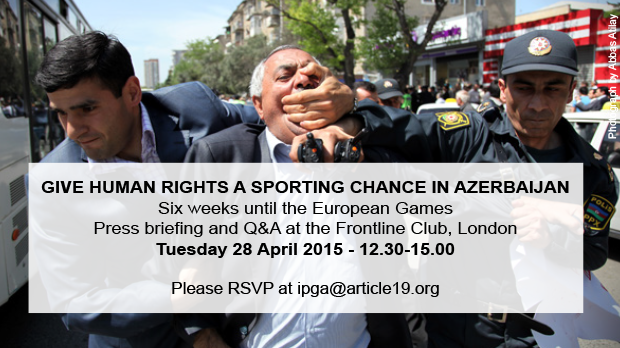
Download invitation
Should human rights activists call for boycotts of sports events hosted by repressive regimes? What responsibility do sports organisations have? How can journalists effectively cover the full scope of human rights, social and political issues surrounding the Baku European Games?
In June 2015, Azerbaijan’s capital Baku will host the first European Games under the umbrella of the European Olympic Committees. Controversy already surrounds this new sporting venture, following reports earlier this year that Azerbaijan will foot the bill for all 50 national Olympic teams to attend.
The country’s internal political situation gives further cause for concern. Over the last twelve months, a wave of arrests of key critics — including human rights activists, election monitors, lawyers and investigative journalists — has almost entirely silenced Azerbaijani civil society, leaving activists and journalists in exile to highlight the regime’s on-going attacks on freedom of expression. Several large NGOs have been closed and legislative amendments make it almost impossible for critical groups to get foreign funding. The government controls all broadcast media, and in December, it forcefully closed the Baku branch of Radio Free Europe/Radio Liberty, a US-funded media organisation.
Meanwhile, Azerbaijan continues an expensive PR campaign to promote its image abroad – with considerable success. International criticism has been largely muted; with the EU and the US looking at ways to foster closer and strategic ties with Azerbaijan.
During this interactive session, our panellists will explore the relationship between sport and human rights, examining the argument that Azerbaijan is using such high profile events to whitewash its image amidst criticism from domestic human rights activists as well as international bodies regarding its human rights records.
The panel, chaired by ARTICLE 19, will bring together Azerbaijani human rights activists, political commentators and international human rights experts. The panellists will include Emin Milli, a former political prisoner in Azerbaijan, now director of Meydan TV, Rebecca Vincent, coordinator of the Sport for Rights Campaign, Giorgi Gogia, Human Rights Watch’s senior researcher on Azerbaijan who was recently denied entry into the country, and others to be confirmed.
The event format will be as follows:
12.30 – 13.00: Arrival, lunch and informal discussion
13.00 – 14.00: Interactive session, featuring Azerbaijani journalists and activists as well as human rights experts.
14.00 – 15.00: Opportunity for one-on-one interviews/discussion with panel members
The Panellists:
Emin Milli is an activist, blogger and co-founder of Meydan TV, an alternative online Azerbaijani news service, operating from Berlin. In August 2009, Milli and Adnan Hajizada, (known as the “donkey bloggers”), were found guilty of hooliganism and imprisoned for more than a year after posting an online video satirising the Azerbaijani government.
@eminmilli
Rebecca Vincent is a human rights activist and former U.S. diplomat who has been working on Azerbaijan for nine years. In December 2012, her Azerbaijani residence permit was revoked in connection with her human rights work in the country, and she has been unable to return to Azerbaijan ever since. She is currently the coordinator of the Sport for Rights campaign.
@rebecca_vincent
Giorgi Gogia is a senior researcher at Human Rights Watch with over a decade of experience working on Azerbaijan. Giorgi was recently banned from travelling to Azerbaijan, preventing him from monitoring the trials of human rights defenders behind bars on politically-motivated charges. He was deported without any explanation after spending 31 hours in Baku’s Heydar Aliyev airport.
@Giorgi_Gogia
This event is hosted by Article 19, Human Rights Watch and Index on Censorship on behalf of the International Partnership Group for Azerbaijan (IPGA). The IPGA is a coalition of 22 international NGOs, coordinated by ARTICLE 19, working to promote and protect freedom of expression in Azerbaijan. The group arose from a broader International Partnership framework established by International Media Support (IMS) and Open Society Foundations (OSF) in 2010. Since then, the IPGA has engaged in joint advocacy around specific events, such as the Eurovision Song Contest and the Internet Governance Forum both of which were held in the Azerbaijani capital Baku in 2012; and has regularly raised issues relating to human rights in Azerbaijan at international and regional institutions, notably the Council of Europe – with Azerbaijan chairing the body’s Committee of Ministers in 2014. – Read more about the IPGA
Where: Frontline Club, 13 Norfolk Place, London W2 1QJ
When: Tue 28 April, 12:30pm
Tickets: RSVP at [email protected]
23 Feb 2015 | Azerbaijan Statements, Campaigns, News, Statements

From top left: Arif Yunus, Rasul Jafarov, Leyla Yunus, Khadija Ismayilova, Intigam Aliyev and Anar Mammadli
With the arrival of the European Union special representative for human rights in Azerbaijan, the country has a unique opportunity to adhere to the international commitments it has signed by releasing detained and imprisoned journalists and human rights defenders.
“We have seen a marked deterioration in the human rights situation in Azerbaijan in recent months. A host of prominent reporters and civil society activists, who play a vital role in holding government to account, have been arrested and their voices silenced. The EU can — and should — do much more to hold Azerbaijan to account,” said Index CEO Jodie Ginsberg.
The special representative, Stavros Lambrinidis, is in the country at the invitation of the Azerbaijani government.
The visit comes as the pre-trial detention of Arif Yunus, a human rights defender, was extended an additional five months. Arrested just days after his wife, Leyla Yunus, on 5 August 2014, Arif Yunus is facing charges of state treason and fraud.
Index recommends that Lambrinidis seek a more balanced view of the human rights situation in Azerbaijan by securing meetings with both Arif and Leyla Yunus, human rights and democracy activist Rasul Jafarov, Anar Mammadli and Bashir Suleymanli, human rights lawyer Intigam Aliyev and journalists Khadija Ismayilova and Seymur Hezi. Mammadli, Suleymanli and Hezi are currently serving prison terms, while the others are in pre-trial detention. Lambrinidis should also visit the the Swiss embassy, where journalist and human rights activist Emin Huseynov has been forced to take refuge from the ongoing crackdown on civil society.
Related:
Dear Ambassador: We must agree to disagree
11 Feb 2015 | Azerbaijan, Azerbaijan Statements, mobile, News, Statements
In January, Index on Censorship reported on the beginning of the trial of human rights activist Rasul Jafarov, who is being tried on spurious charges. The Azerbaijani embassy has written to Index on Censorship responding to that article. This is the Index response to the embassy.
Dear Ambassador Tahir Taghizadeh,
Thank you for your letter in response to our report on the beginning of the trial of human rights and democracy activist Rasul Jafarov.
In your letter, you wrote:
“In my country, human rights and fundamental freedoms are ensured in full compliance with the national and international commitments that Azerbaijan has subscribed to. No one is persecuted for his/her political views and activities as proved by Azerbaijan’s vibrant political process and free and diverse media.”
We beg to differ with your point of view.
Azerbaijan’s record on human rights and a free press has been discussed with great concern at the international level many times in recent years.
In March 2012, Index on Censorship joined with Article 19, Human Rights House Foundation, International Federation of Journalists, Media Diversity Institute, Norwegian Helsinki Committee, Reporters Without Borders and World Association of Newspapers and News Publishers to co-produce Running Scared: Azerbaijan’s Silenced Voices. The report opened with this stark warning: “The current state of freedom of expression in Azerbaijan is alarming, as the cycle of violence against journalists and impunity for their attackers continues; journalists, bloggers, human rights defenders and political and civic activists face increasing pressure, harassment and interference from the authorities; and many who express opinions critical of the authorities – whether through traditional media, online, or by taking to the streets in protest – find themselves imprisoned or otherwise targeted in retaliation.”
In December 2012, the Parliamentary Assembly of the Council of Europe issued a monitoring report that included the comments that the “situation with regard to basic freedoms, including freedom of expression, freedom of assembly and freedom of association is preoccupying. The committee expresses its alarm at reports by human rights defenders and domestic and international NGOs about the alleged use of so-called fabricated charges against activists and journalists. The combination of the restrictive implementation of freedoms with unfair trials and the undue influence of the executive results in the systemic detention of people who may be considered prisoners of conscience. Alleged cases of torture and other forms of ill-treatment at police stations, as well as the impunity of perpetrators, raise major concern”.
In April 2013, the Human Rights Council of the United Nations work group issued its report from Azerbaijan’s universal periodic review. Among the recommendations were suggestions for improvements on human rights and more specifically freedom of expression:
• Ensure the full enjoyment of the right to freedom of expression in line with country’s international commitments (Slovakia)
• Guarantee the rights to freedom of expression, association and peaceful assembly particularly by allowing peaceful demonstrations in line with the obligations stemming from the International Covenant on Civil and Political Rights (Switzerland);
• Put in place additional and fitting measures to ensure respect for freedom of expression and of the media (Cyprus);
• Ensure that Azerbaijani media regulations uphold diversity among media outlets, as per international standards and best practices (Cyprus);
• Expand media freedoms across print, online and, in particular, broadcast platforms, notably by ending its ban on foreign broadcasts on FM radio frequencies and eliminating new restrictions on the broadcast of foreign language television programs (Canada);
• Take effective measures to ensure the full realization of the right to freedom of expression, including on the Internet, of assembly and of association as well as to ensure that all human rights defenders, lawyers and other civil society actors are able to carry out their legitimate activities without fear or threat of reprisal (Czech Republic);
• Ensure that human rights defenders, lawyers and other civil society actors are able to carry out their legitimate activities without fear or threat of reprisal, obstruction or legal and administrative harassment (Sweden);
• Put an end to direct and indirect restrictions on freedom of expression and take effective measures to ensure the full realization of the right to freedom of expression and of assembly (Poland);
• Ensure the full exercise of freedom of expression for independent journalists and media, inter alia, by taking into due consideration the recommendations of the Council of Europe Commissioner for Human Rights (Italy);
• Ensure that journalists and media workers are able to work freely and without governmental intimidation (Germany);
• Ensure that journalists and writers may work freely and without fear of retribution for expressing critical opinions or covering topics that the Government may find sensitive (Slovenia);
• Protect and guarantee freedoms of expression and association in order to enable human rights defenders, NGOs and other civil society actors to be able to conduct their activities without fear of being endangered or harassed (France);
• Strengthen measures to guarantee a safe and conducive environment for the free expression of civil society (Chile);
• Remove all legislative and practical obstacles for the registration, funding and work of NGOs in Azerbaijan (Norway);
• Ensure that all human rights violations against human rights defenders and journalists are investigated effectively and transparently, with perpetrators being promptly brought to justice, including pending unresolved cases requiring urgent attention (United Kingdom);
• Ensure prompt, transparent and impartial investigation and prosecution of all alleged attacks against independent journalists, ensuring that
the media workers do not face reprisals for their publications (Slovakia);
Though Azerbaijan has the modern legal framework in place to respond to these suggestions from the international community, the respect for the rule of law is sorely lacking.
In October 2013, Index on Censorship published Locking up free expression: Azerbaijan silences critical voices, which described the situation in your country in the run up to the presidential elections.
We wish that was the end of the story, that our insistence that Azerbaijan respect free of expression was based on outdated information or thoroughly implemented international recommendations.
But in 2014 the assault against journalists and human rights activists accelerated with detentions of well-respected individuals with international profiles and the temerity to speak some uncomfortable truths to the government of Azerbaijan.
These are just a few of the cases against journalists and human rights activists that we follow:

Anar Mammadli and Bashir Suleymanli
Anar Mammadli and Bashir Suleymanli — sentenced to 5.5 and 3.5 years respectively in May 2014 — are prominent human rights activists and founders of the Election Monitoring and Democracy Studies Centre. They were arrested and jailed in 2013, following outspoken criticism of presidential elections in October 2013, despite international protests. Those are the same polls that invited election observers from the OSCE found lacking. On 29 September 2014, Mammadli was awarded the Václav Havel Award for Human Rights by the Council of Europe.
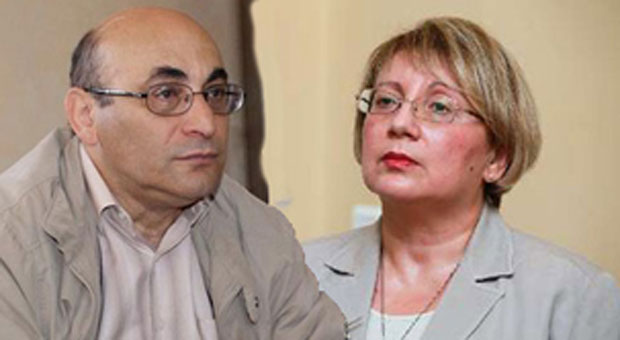
Arif and Leyla Yunus (Photo: HRHN)
Leyla Yunus — arrested 30 July 2014 — is the director of the Peace and Democracy Institute, which among other things works to establish rule of law in Azerbaijan. She has been charged with state treason (article 274 of the Criminal Code of the Republic of Azerbaijan), large-scale fraud (article 178.3.2), forgery (article 320), tax evasion (article 213), and illegal business (article 192). On 18 February, her pre-trial detention was extended for another five months. Her husband Arif Yunus was arrested 5 August 2014. Arif Yunus is facing charges of state treason and fraud. Both have had their initial three month pre-trial detentions extended.
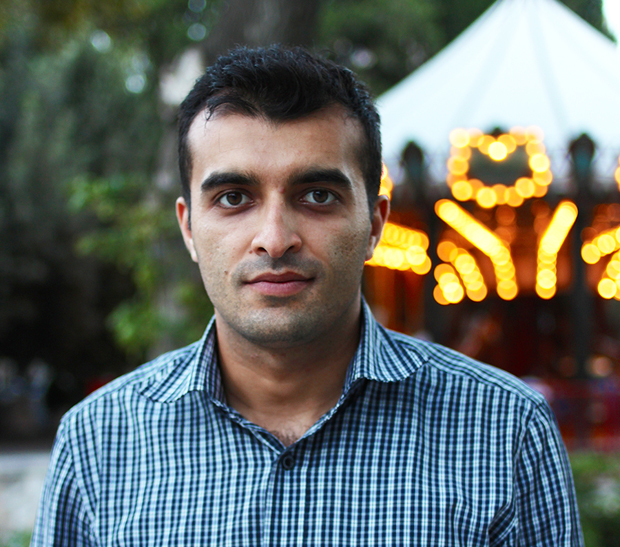
Human rights and democracy activist Rasul Jafarov (Photo: Melody Patry)
Rasul Jafarov — arrested 2 August 2014 — one of the initiators and coordinators of the campaign “Sing for Democracy” and “The Art of Democracy”, advocated for the rights of political prisoners, actively participated in the International Platform “Civil Solidarity.” He is accused of: tax evasion (Article 192), illegal business (Article 213) and malpractice (Article 308). The charges carry a possible sentence of 12 years.
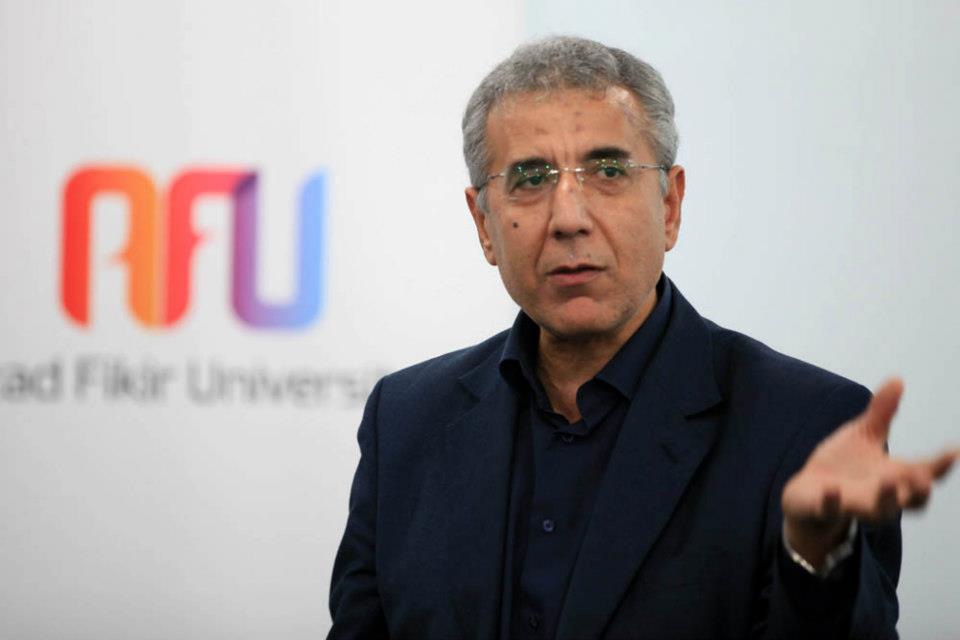
Lawyer Intigam Aliyev
Intigam Aliyev — arrested 8 August 2014 — is a human rights defender and a lawyer specialized in defending rights of citizens in the European Court of Human Rights. He is charged with Articles 213.1 (tax evasion), 308.2 (malpractice) и 192.2 (illegal business) of the Criminal Code. Index was heartened to hear that Aliyev was at least allowed to sit with his lawyers in court on Feb 3.
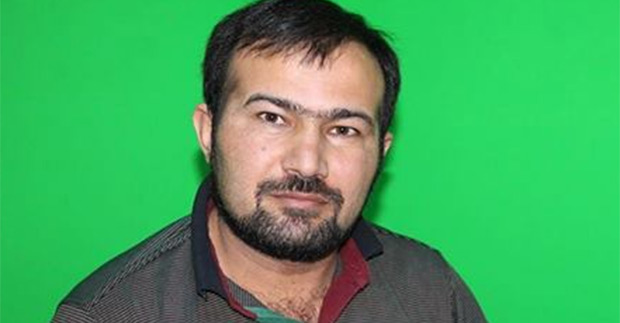
Journalist Seymur Hezi
Seymur Hezi — arrested 29 August 2014 — works for independent newspaper Azadliq and host of the news programme “Azerbaijan Hour”. He is a member of the opposition Popular Front Party. Index reported on January 29 that Hezi was sentenced to a five-year prison sentence on charges of “aggravated hooliganism” on 29 January.
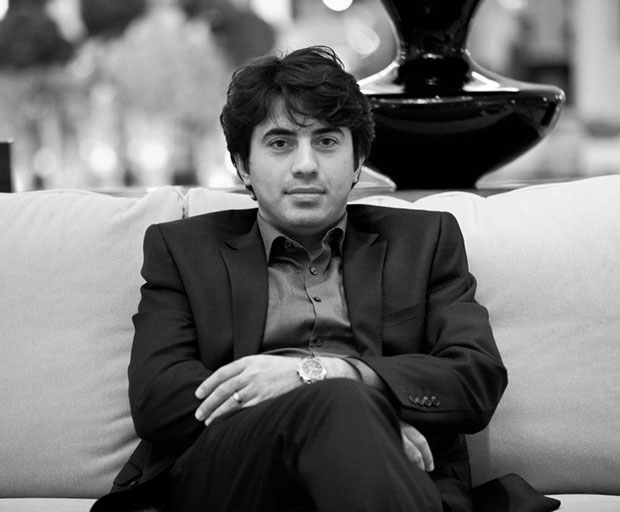
Emin Huseynov, journalist and human rights defender, director of the Azerbaijani Institute for Reporters’ Freedom and Safety (IRFS)
Emin Huseynov — went into hiding in August 2014 — is an internationally recognised human rights defender and leader of the Institute for Reporters’ Freedom and Safety (IRFS). IRFS is the leading media rights organisation in Azerbaijan and one of the main partner organisations of the Human Rights House Network in the country. Huseynov was charged with tax evasion, illegal business and abuse of authority after he went into hiding at the Swiss embassy. Florian Irminger, head of advocacy at the Human Rights House Foundation (HRHF), of which Index is a network member, called on Switzerland to continue to host Huseynov. “His location at the embassy is justified by the level of the repression in the country, the bogus charges brought against human rights defenders in Azerbaijan and the impossibility for them to defend themselves in court, due to the lack of independence of the judiciary and the harassment of their lawyers.”

Khadija Ismayilova
Khadija Ismayilova — arrested on 5 December — is an investigative journalist and radio host who is currently working for the Azerbaijani service of Radio Free Europe/Radio Liberty. She is a member of the Organized Crime and Corruption Reporting Project. She was arrested under charges of incitement to suicide, a charge widely criticised by human rights organizations. Ismayilova is currently being supported by two petition campaigns by Index on Censorship and Reporters Without Borders. On 13 Feb, lawyer Fariz Namazly told Contact.az that new charges have been filed. According to him, Ismayilova is charged under the Article: 179.3.2 (large-scale embezzlement), 192.2.2 (illegal business), 213.1 (tax evasion) and 308.2 (abuse of power.) The charges carry a possible sentence of 12 years.
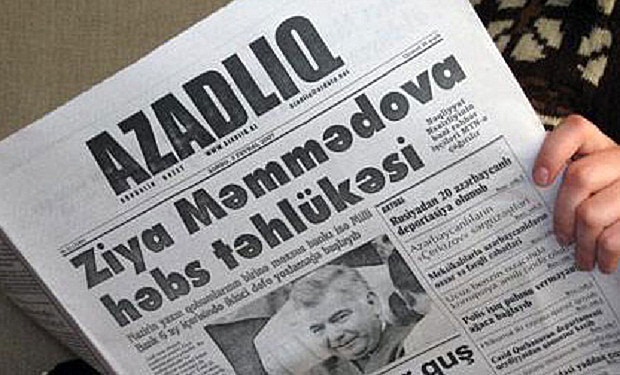
Award-winning newspaper Azadliq was forced to halt its print edition in July 2014 as its bank accounts were frozen. We reported on this in August 2014.
In September, the European Parliament adopted a resolution on the human rights situation in your country.
In November, Nils Muižnieks, the Council of Europe Commissioner for Human Rights, called his autumn 2014 mission to Azerbaijan one of the most difficult of his tenure. He wrote, “In late October I was in Azerbaijan, the oil-rich country in the South Caucasus, which just finished holding the rotating chairmanship of the 47-member Council of Europe. Most countries chairing the organisation, which prides itself as the continent’s guardian of human rights, democracy and the rule of law, use their time at the helm to tout their democratic credentials. Azerbaijan will go down in history as the country that carried out an unprecedented crackdown on human rights defenders during its chairmanship.”
You mention in your letter that individuals are not being arrested for their human rights work but it seems an astonishing coincidence that all these prominent human rights defenders should all be guilty of such an array of financial crimes. And that brings us full circle to the present. Since we received your letter, there have been several developments that we would like to brief you on:
On 29 January 2015, a provisional resolution before the CoE called attention to the cases of investigative journalist Khadija Ismayilova, human rights activist Emin Huseynov and the closure of Radio Free Europe/Radio Liberty. Further on in the resolution PACE was being asked to call on Azerbaijan to properly investigate the murders of journalists Elmar Huseynov (2005) and Rafiq Tagi (2011).
On 3 Feb, President Aliyev signed an amended media law that restricts press freedom by making it easier to shutter media outlets.
Just today, Reporters Without Borders released its World Press Freedom Index 2015, which places Azerbaijan at 162. That’s down 2 spots from last 2014.
We wish Azerbaijan’s commitment to a “free and diverse media” was more than just words and we will continue to report on these detentions – as we do globally – for as long as these words are not translated into action.
Best regards
Jodie Ginsberg
Chief Executive
Index on Censorship
29 Jan 2015 | Azerbaijan, Azerbaijan News, mobile, News

Azerbaijani journalist Seymur Hezi, who works for Index on Censorship Freedom of Expression Award-winning newspaper Azadliq, has been sentenced to five years imprisonment for “aggravated hooliganism”, according to Azadlıq Radiosu.
“Index condemns the sentencing of Azerbaijani journalist Seymur Hezi, who was arrested last year on trumped up charges of disorderly conduct. The ‘crime’ for which he is actually being punished is journalism and his attempts to tell the truth about a brutal authoritarian regime that systematically stifles dissent,” Index CEO Jodie Ginsberg said.
Hezi’s sentencing is another sign of the continuing clampdown by Azerbaijan’s authoritarian government on civil society. Earlier this week, investigative journalist Khadija Ismayilova‘s pre-trial detention period was extended by a Baku court; other prominent human rights defenders who have been arrested in recent months include: Leyla Yunus, Arif Yunus, Rasul Jafarov, Anar Mammadli and Intigam Aliyev.
Hezi was arrested on August 29 2014 after an altercation in which the journalist said he was protecting himself from a physical assault and harassment, according to his lawyers.
Azadlıq Radiosu reported that Hezi’s lawyers and family are certain the arrest and the sentence are politically motivated and that Hezi is innocent.
His father, Meshqul Heziyev told Azadlıq Radiosu, “the hearing was biased and turned down all of the motions. At the end it simply carried out a politically motivated order”.
“Seymur Hezi’s arrest is a serious blow against our newspaper. He is one of the brightest Azerbaijani analysts and journalists, and a true intellectual,” Rahim Haciyev, acting editor of Azadliq newspaper, told Index at the time of Hezi’s arrest.
Haciyev said he is sure Hezi’s arrest is the result of a planned provocation and the journalist is prosecuted for publishing critical articles on the authorities in the newspaper, as well as in his online TV program “Azerbaijani Hour”, which he scripts and hosts.
In March 2011, Hezi was abducted and tortured by unidentified men. He was warned to keep quiet.
Seymur Hezi is also host of news programme “Azerbaijan Hour” and is a member of the opposition Popular Front Party.
This article was published on 29 January 2015 at indexoncensorship.org










